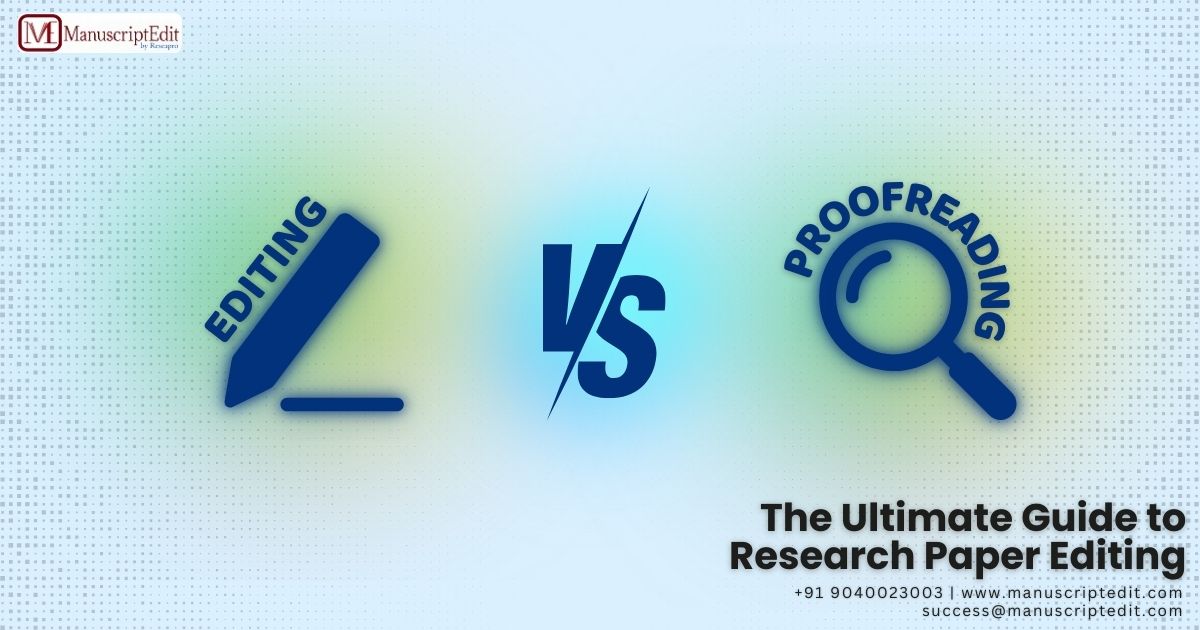|
Getting your Trinity Audio player ready...
|

Submitting a research paper? You’ve poured months into your work, but even minor errors can hinder publication. Studies show that 83% of journal rejections stem from poor language quality, not flawed research. That’s where professional research paper editing steps in. In this guide, you’ll learn how expert editors transform drafts into polished, submission-ready manuscripts—and how to choose the exemplary service for your needs.
Table of Contents
What’s the Difference Between Editing and Proofreading?
Most researchers mix up these two most important steps:
• Editing: Addresses overall problems: clarity, organization, reason, and academic voice.
• Proofreading: Attends to surface problems: grammar, spelling, punctuation, and format.
Why both are necessary: Editing makes your ideas shine, but proofreading keeps readers focused. Skipping one jeopardizes acceptance.
5 Reasons You Need a Professional Editor
1. Improve Credibility: Journals seek submissions free from errors and with solid organization.
2. Save Time: Let professionals shape your words while you conduct research.
3. Objective Comments: Editors identify holes you missed.
4. Style Compliance: APA, MLA, or journal style formatting? Editors ace it.
5. Increased Acceptance Rates: 40% of authors achieve faster publication after professional editing.
Tailored Services for Every Manuscript
Our editors specialize in:
• Research Papers: Strengthen arguments, enhance flow, and achieve journal requirements.
• Theses: Maintain consistency between chapters and university standards.
• Academic Articles: Optimize your abstract, keywords, and references.
How It Works: Draft to Publication
Our 5-step process guarantees perfection:
1. Submission: Upload your draft.
2. Structural Edit: Repurpose sections for maximum impact.
3. Line Edit: Sharpen sentences for clarity and concision.
4. Proofreading: Remove grammar and formatting glitches.
5. Final Review: Get a revised manuscript with marked changes.
7 Quick Fixes to Polish Your Draft
Before calling in a pro editor, take these DIY remedies:
1. Read Aloud: Detect awkward phrasing.
2. Use Grammarly: Correct obvious typos.
3. Check Formatting: Read journal format for headings, margins, and fonts.
4. Make It Clear: Use simpler words so more people can understand.
5. Check Citations: Make sure all sources are correctly cited.
What to Expect from a Professional Editor
Prevent amateur errors by hiring editors who:
Possess advanced degrees in your discipline.
Offer sample edits.
Ensure confidentiality.
Provide explicit turnaround times (e.g., 48 hours for rush projects).
Frequently Asked Questions
Q: Do you edit non-science documents?
A: Yes, we work on all academic topics.
Q: Will my document be kept confidential?
A: Definitely. We promise privacy and data protection.
Q: May I ask for specific changes?
A: Yes, simply let us know your requirements!
Ready to Submit with Confidence?
Avoid unnecessary delays due to preventable mistakes. Receive a free quote within 1 hour and become one of the thousands of researchers who have trusted us to refine their work. Click below to begin your path to a perfect manuscript!



